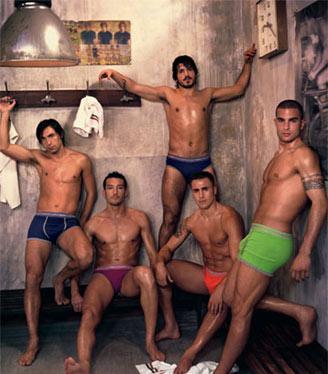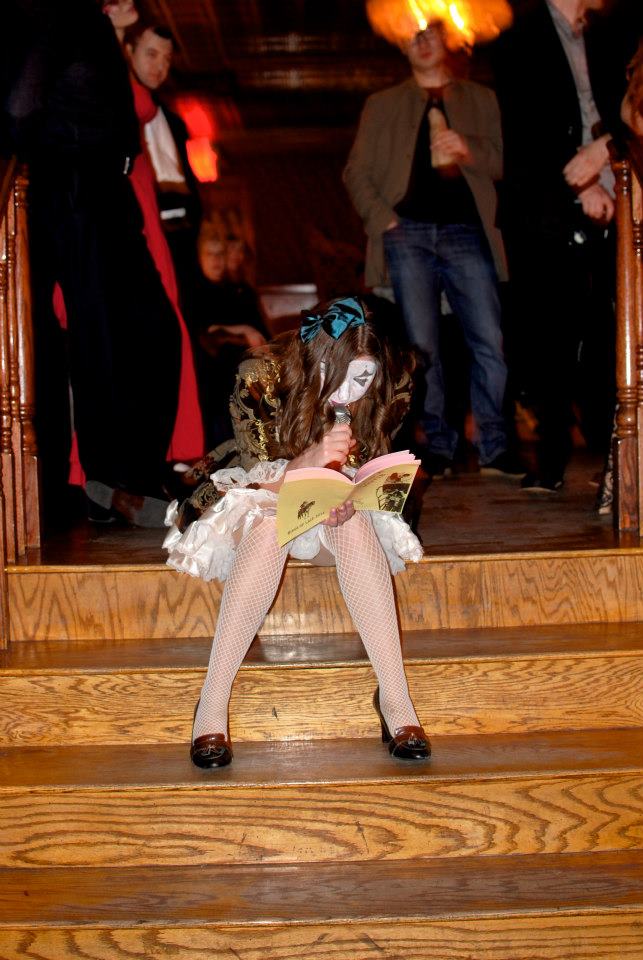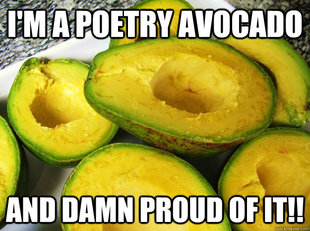Dear Rauan,…(6)
*****
[ note: some letters, like this one, require immediate attention — which is fine by me, because, of course, I am here to help, day and/or night ]
Veronica from Northern California:
dear rauan,
my son is gay but far worse I think she’s a poet and I am quite anxious for her. I know I am a worry wart but poets in their poor little poetry fantasy world are such a sad sack full of bad laundry.
and people are cruel and hate! … rauan, I need to change my kid. what can I do? where can I send her?
thank you in advance
Veronica D.
*****
*****
And, so–
Rauan Responds:
*****
Dear Veronica,
1) let’s start with Flannery: “He and the grandmother discussed better times. The old lady said that in her opinion Europe was entirely to blame for the way things were now. She said the way Europe acted you would think we were made of money and Red Sam said it was no use talking about it, she was exactly right.”
2) This may be counterintuitive READ MORE >
Mistakes Friends Made

In the second season of Friends, Rachel—in what could be construed by the spiritual as divine intervention—is seen, between takes, suddenly wearing a necklace. The famous episode concerns Ross, whose budding relationship with another woman (they recently acquired a cat) summons dormant feelings in the waitress, whose real life actress, Jennifer Aniston, is to go on—through divorce and a kind of, in my mind, nobly unmarketed depression—to embody the developing cougar. They kiss for the first time in this episode, the laugh track giggles supplemented by oohs and awws. In this modern Romeo & Juliet, a “conceited tragedie” according to the 1597 first edition title page, the two rivaling families are replaced by the likewise quarrelsome rent vs. romance. Rachel’s spontaneous, perhaps wishful, necklace is captured by Movie Mistakes, a website featuring stills of logical inconsistencies in popular television and film. While these may all be simply attributed to overworked P.A.s occasionally letting logic slip by, each incident has spiritual gist, if by “spiritual” we mean the irrational answer to irrational quandaries: the sudden appearance of an object, or feeling.
I Still Think About the Bomb Sometimes

After The Day After ran on ABC in November, 1983, it took me weeks to sleep normally again. The attack scene cycled through my brain, night after night. But not the panicky running and the electromagnetic pulse. Just the mushroom cloud. Just the bright light revealing the skeletons within the doomed. Just the fire and the flash.
Much of The Day After takes place in Kansas City. At the time, my family and I lived in Kansas City. Because of The Day After, and until he left office, I was always at least a little afraid of Ronald Reagan.
§
This pizza place near our house had some arcade cabinets, and the one I liked best was Missile Command.
Here’s the best decision the designers of Missile Command made on the cabinet: they gave it a trackball. A joystick makes reliable moves. A trackball is about imprecision. READ MORE >
Presents to Give Carina Finn For Her Birthday
Today is the day a stork (supposedly one who was wearing a Miu Miu baby doll dress and a demure dark bow in her hair) delivered Carina Finn — poetess, visual artist, baker, and girl — to her mommy. Everyone should buy her a present. Here’s some suggestions.
* A cupcake with lemon frosting.
* A cupcake with mint frosting.
* This Belle Ensemble.
* A cupcake with strawberry icing and sprinkles.
* A pair of sunnies or maybe even a pair of specs, like the kind Marilyn Monroe wears in How To Marry a Millionaire.
* This Belle Fairytale Journal.
* A chocolate cupcake with vanilla icing (if there are sprinkles on it then don’t bother).
* And obviously this Belle Tiara because all admirable girls should absolutely be attired in a Belle Tiara.
***
You can read about some of the gossip concerning the birthday of Baby Carina (who’s not interchangeable with Carina Finn, ok) on Bambi Muse right here.
August 16th, 2013 / 1:20 pm
ANTIPHONAL AIRS
 Antiphonal Airs
Antiphonal Airs
by Joseph Noble
Skylight Press, 2013
124 pages / $15.99 Buy from Skylight Press or Amazon
“What is wonderful about music is that it helps man to concentrate or meditate independently of thought. Therefore music seems to be the bridge over the gulf between the form and the formless. If there is anything intelligent, effective, and at the same time formless, it is music.” — Hazrat Inayat Khan, “Spiritual Attainment by the Aid of Music”
“One must side with Brahms or with the sun.” — E.M. Cioran, All Gall Is Divided
Antiphonal Airs interacts with the musical vibration of “transforming what is unseen into what is heard / what is unheard into what is imagined.” These grandiloquent gestures soar through entirely agreeable intonations, creating an excellent sensory experience. Here the music of poetry is refracted through early Italian Baroque music. Noble explores little-known yet magnificent composers, such as Nicola Matteis, Marco Uccellini, Giovanni Legrenzi, and Sigismondo D’India, to name just a few. As a classical music lover, this is pure delight.
On the similarities between poetry and music, Noble writes, “they both use sound, both take place in time, both seem to move with a fluidity of association at times, both have a sensual dimension to them, both can be an outcry or a whisper and everything between, are articulations of vibrating air, and both are avenues of enlightenment.” Antiphonal Airs is full of rich and vibrant poems, their lyrical nature echoing and reflecting the work of master composers.
air forgets its name
(water upon the sun)a fever fingers syllables
(ink spilling its reins)
uccellino,
harp in the street
(who turns the sun?)
song wheel in the iris
(swallow dilating sleep)
uccellino,
river flings itself into its reflection
(drum collides with the wind)
air is shaping the ear
(map on the tympanum)
uccellino,
angel climbs through the arm
(which finch in the ankle?)”
August 16th, 2013 / 11:00 am
On the End of Love
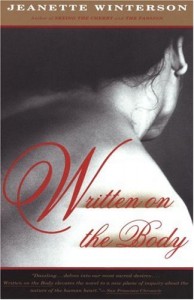 Written on the Body
Written on the Body
by Jeanette Winterson
Vintage, February 1994
192 pages / $14.95 Buy from Amazon
&
To the Wonder
Dir. Terrence Malick
2012
I
To put it another way
I would give all metaphors
in return for one word
drawn out of my breast like a rib
for one word
contained within the boundaries
of my skin
but apparently this is not possible
and just to say – I love
I run around like mad
picking up handfuls of birds– Zbigniew Herbert “I Would Like To Describe”
The greatest irony for a writer, a person obsessed with language is to run into the boundaries of words. In our intense, overwhelming moments these faithful friends fail us when we need them most. All artists seek to express something, but what do you do at the end of expression?
That we call the ineffable the “ineffable” points to the paucity of our expressive capabilities. This is both a universal and a poignant contemporary problem. Post-modernity, while often exaggerated, highlighted the strange duality of living in a world constructed by words and the attending inability to transcend the world of words. From time immemorial artists understood the inability to translate the wondrous into a chain of letters and symbols, but with the accretion of time the problem of clichés grew, leaving many to shrug in cynicism at our inability to say anything new or urgent.
II
“Love demands expression. It will not stay still, stay silent, be good, be modest, be seen and not heard, no. It will break out in tongues of praise, the high note that smashes the glass and spills the liquid.”
– Jeanette Winterson, Written on the Body
It would be the greatest torture, if love really could contain such a self-contradiction, for love to require itself to keep hidden, to require its own unrecognizability.
– Soren Kierkegaard, Works of Love.
No topic has seemed to run its course more than our abiding obsession with love. We like to think of this obsession as timeless. We recall Shakespeare’s sonnets, and the urgings of Jesus, but love rarely engendered this kind of devotion as it does in our time. In an increasingly secular and secularized world, Love has become our universal religion, our God, the altar at which we pray. It provides the foundational meaning of our lives and defines our pursuits. In our zeal and haste we’ve plundered the emotion, the experience, the concept leaving it bloodied, bruised, depleted. No sentence has more fill-ins than the sentence Love is_________.
Yet, as Winterson writes eloquently, love does demand expression. An unexpressed love is hidden, narcissistic, predatory, and painful. In the same breath Winterson writes, “It’s the clichés that cause the trouble.” There is no greater cliché than “I love you” and yet, there is nothing that needs expression more than love.
A sort of artistic paradox.
Clichés about love not only threaten the ability to express our deepest emotions and thoughts, but force us to experience love in the shadows of other people’s conception.
Do you fall into love, or create it? Does love grow or wither, does it overtake your life? Does it matter?
READ MORE >
August 16th, 2013 / 10:55 am
23 More People Who Made Me Care About Poetry in 2013 (From One of the Million People Who Will Make You Care About Poetry in 2013)

When I first moved to Manhattan in 2008, I roughly knew about three people in the entire city. I lived in a bedbug-infested apartment on 139th Street with a sugar baby, a Bubba Gump Shrimp waiter, and a digital retoucher. At the time, I thought I was going to work as an assistant in photo studios while applying to MFA programs on the side—a plan that ended up completely shifting (no MFA, au revoir photo world)—but that’s not what I’m here to write about. I knew nothing of the NYC literary world, especially that of poetry. One day I had wandered into a library near 103rd to check out some familiar books. I saw a flyer for POETRY DISCUSSION GROUP / TONIGHT’S THEME: DEATH and hung around, hoping to meet some poets. And talk about death, of course.
What I ended up was sitting in a circle with about a dozen people, myself the only person under 60. As one cantankerous woman pointed out—most of them were “sitting in god’s waiting room” & it was “foolish to romanticize death”. This lead to a shouting match between attendees. So there I sat, hands in lap, in a coven of curmudgeons, horribly embarrassed at how much I misgauged what I thought I would be participating in. This is not to say that these old folks couldn’t have schooled me. I perhaps have never witnessed a more intensely personal discussion of death with any group of strangers in such a short amount of time in such a public space. But my point is that geography is a strange creature, containing wheels inside wheels. I wanted to meet young poets in their early 20s who would show me who they were reading, where they were reading at, where they hung out. This Upper West Side library, much to my ignorance, was not that place. I didn’t find that niche for a long time, even though we all lived inside the same city. It took many misguided open mics and weird basement readings to find the people I wanted to be around.
In some ways, I’d say this year is the first year I’ve been asked to read at series that I didn’t have to creepily solicit (although I still creepily solicit). It wasn’t until my first chapbook came out last fall that people gradually stopped introducing me as “that guy who runs Moonshot“. Every day is baby steps, is one poem after the other. I think it’s important to highlight these gooey ‘writer journeys’ we hear about over and over again to show how people find their way to meeting writers and literary scenes they care about. It’s hard when you’re on the outside and suspect others are members of a literary cabal who are only interested in helping each other out. I’ve been there. I’m still there, in many ways. Not everyone who lives in NYC is geographically self-obsessed or entitled or had everything fall into their lap instantly. Does this even need to be said? It took five years just to reach a point where the lit projects I’ve started here (or been involved with) have been around long enough where it people come up to me and say they know who I am, what I do. It hasn’t gotten less jarring yet—maybe one day it will.
Perhaps this is why it’s equally surprising to find myself on a list called 23 People Who Will Make You Care About Poetry in 2013. It’s even stranger to watch people—in response to this list—echo criticisms I’ve made of NYC’s poetry scene—white, exclusive, cliquey, centered around itself. Except, in this case, I was included on an exclusionary list. I’m now that person. Numbered lists are incredibly tricky to begin with because they seem so incredibly final, as if there are no others. Here are the 23 chosen ones. There is a glib part of me that wants to say we should take these kinds of lists with a grain of salt, that wants to point out that media sites have to churn out dozens of these insipid listicles per day—but I know that will incise—and I recognize that it’s my privilege that would allow me such flippancy.
“Instead of judging the poem, let’s become overtaken by it.”
Janice brought this up a few days ago, but I think it bears repeating. Johannes Göransson continues to mash blueberries and puncture orchids while juggling swords and cacti over at the Harriet blog this month with his “Corean Music” posts.
Here’s a powerful glimpse from his latest, which seems to reverberate across a similar body of water I attempted to canoe sometime ago with my “How To Be A Critic” posts:
WAKEFIELD PRESS REVIEW: THE YOUNG GIRL’S HANDBOOK OF GOOD MANNERS
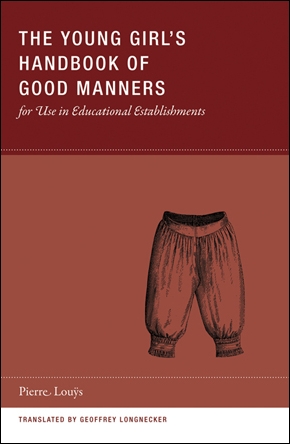 The Young Girl’s Handbook of Good Manners for Use in Educational Establishments
The Young Girl’s Handbook of Good Manners for Use in Educational Establishments
by Pierre Louÿs, translated by Geoffrey Longnecker
Wakefield Press, March 2010
80 pp. / $12.95 Buy from Wakefield Press
The first time I ever heard of Pierre Louÿs was when I read Susan Sontag’s essay, “The Pornographic Imagination.” In it, among other things, she posits five works of literature that bridge the gap between pornography & erotic, expanding into very Literary territory. Louÿs’s book was the only I hadn’t read. I tracked it down–it’s title The She-Devils–and was sorely disappointed in the translation. Despite this, I had still enjoyed the narrative, and filed the name in the back of my head to keep at bay in my never-ending path through erotic literature.
Years later, Louÿs’s name came up again–but this time as a correspondent of Mallarmé. It might strike some as strange that Mallarmé–who has probably garnered as many stuffy academic essays as God himself (though I prefer the former far more than the latter, let it be said)–chafed elbows, so to speak, with a man whose primary literary concerns were pedophilia, scatology, and whores. Louÿs was a part of the vaguely shaped Symbolist movement in France as the 19th century slipped into the 20th, immediately following the Fin de Siecle ‘movement’ that had shown artists and writers that certain ideas were now available subjects. Baudelaire was a major influence on the symbolists, as was Edgar Allen Poe.
Louÿs is most often considered a novelist, but the brilliant Young Girl’s Handbook of Good Manners instead takes the form of a satirical handbook–lampooning school guides to “good manners” and instead positing sixty pages of sexual advice, tongue planted firmly in cheek. It could perhaps be considered that this could become, shall we say, boring, or perhaps overdone, but Louÿs is a master parodist, in addition to being a damn good writer, so the laughs just keep coming.
I’m not one for humor unless it’s delivered via a sort of combination of hyperbole, absurdity, and base-ness, which the Handbook delivers in spades. The aphoristic fragments are all structured under headings, such as “Games and Recreations” (“Never masturbate a young man by the window. You never know on whom it might fall.”), “At the Ball” (“If you cum while waltzing, say so softly; don’t shout it out.”), and even a special column, “On Losing Your Virginity.”
There is no narrative thread, only a bawdy romp to be followed, with aphorism after aphorism delving into a perversely juvenile mind. There’s a total jouissance present in many of the acts which Louÿs implores ones not to do, and this set-up provides the idea that young girls are performing these acts with regularity (and who knows–perhaps they are; I was never a young girl).
– – – – – – – – – – – – –
Former WAKEFIELD PRESS reviews:
TREATISE ON ELEGANT LIVING by Honoré de Balzac
August 15th, 2013 / 11:06 pm



